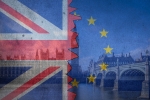I understand the Chequers agreement and the White Paper is not agreeable to everybody and some are not happy with the compromise proposed. Negotiations such as these are not only complicated but are also without precedent. Unravelling a trading relationship which has operated for over forty years is going to be difficult, as will negotiating our future arrangements with our European partners. Politicians and many others have spoken about what they feel Brexit should look like: continued participation in the Customs Union or outside the Single Market and Customs Union altogether - to mention a few. Sometimes referred to as hard and soft Brexit. However, whilst everybody has individual judgements about the Government’s proposals, it is ultimately the Prime Minister who has the responsibility and accountability to see the proposal through and propose an offer to the EU to ensure we achieve the best deal for our country.
The options to revert to WTO rules (so called "no deal") would mean, as reported in the press, a varying degree of disruption to business, and staying within the Customs Union and/or Single Market would mean we continue with free movement of people and would outsource the negotiation of future trade deals to the EU. All available negotiating options come with their own degree of risk, either to businesses or to the Government’s pledges to end free movement of people, avoid a hard border in Northern Ireland, stop membership payments to the EU and negotiate our own future trade deals. The White Paper (the so called "Chequers plan") therefore represents a compromise, one that seeks to deliver on the Government’s pledges whilst also protecting British businesses. For frictionless trade to continue we ultimately need to work to common standards for agri-foods and industrial goods, and the proposals outlined in the White Paper allow for this. Under the Government’s proposals we would be able to have different tariffs but not different standards. Given these rules have been relatively stable since the late 1980s I think it’s a workable proposal assuming we have an implementation period.
Services such as financial and digital are more complex, as regulation and standards are evolving as we consider the impact of new technology. Therefore we will want to determine our own future regulations for these industry sectors, particularly where we are market leaders, such as in financial services.
We all have views on the course the Government has decided to take. However, I personally believe that if a deal had been presented to us in 2015 that would have ended freedom of movement, stopped future payments to Brussels, take us out of the Common Fisheries and Agricultural Policies, continue frictionless trade with Europe whilst averting a hard-border in Northern Ireland we would have readily agreed to it. The low-risk approach the Prime Minister and the Cabinet have adopted is a practical proposal that has listened to businesses and seeks to deliver on the Government’s pledges and the clear messages sent from the Referendum. Unravelling our existing trading relationship is going to be difficult, but overall I think the White Paper is the best approach to establish a future relationship with the EU, though of course it will require compromise from both sides.
Throughout, several views have been aired as to how we should conduct the negotiations, and Ministers have had considerable scope to express their own opinions. However, I think it’s right that collective responsibility has been restored, and I believe it is vital that the Government negotiates with one voice at this critical stage of talks. I believe that the time for considering the various views has passed, and now we must focus on reaching the best possible deal for our country. We should not underestimate the scale of this task as it will require our European partners to compromise and also for them to prioritise the continuation of business and the protection of jobs in the negotiations. Time will tell if this approach will succeed but I believe the Prime Minister is right to try.

